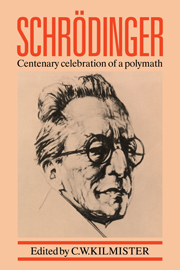Book contents
- Frontmatter
- Contents
- List of contributors
- Preface
- 1 Introduction
- 2 Boltzmann's influence on Schrödinger
- 3 Schrödinger's original interpretation of the Schrödinger equation: a rescue attempt
- 4 Are there quantum jumps?
- 5 Square root of minus one, complex phases and Erwin Schrödinger
- 6 Consequences of the Schrödinger equation for atomic and molecular physics
- 7 Molecular dynamics: from H+H2 to biomolecules
- 8 Orbital presentation of chemical reactions
- 9 Quantum chemistry
- 10 Eamon de Valera, Erwin Schrödinger and the Dublin Institute
- 11 Do bosons condense?
- 12 Schrödinger's nonlinear optics
- 13 Schrödinger's unified field theory seen 40 years later
- 14 The Schrödinger equation of the Universe
- 15 Overview of particle physics
- 16 Gauge fields, topological defects and cosmology
- 17 Quantum theory and astronomy
- 18 Schrödinger's contributions to chemistry and biology
- 19 Erwin Schrödinger's What is Life? and molecular biology
- Index
9 - Quantum chemistry
Published online by Cambridge University Press: 19 January 2010
- Frontmatter
- Contents
- List of contributors
- Preface
- 1 Introduction
- 2 Boltzmann's influence on Schrödinger
- 3 Schrödinger's original interpretation of the Schrödinger equation: a rescue attempt
- 4 Are there quantum jumps?
- 5 Square root of minus one, complex phases and Erwin Schrödinger
- 6 Consequences of the Schrödinger equation for atomic and molecular physics
- 7 Molecular dynamics: from H+H2 to biomolecules
- 8 Orbital presentation of chemical reactions
- 9 Quantum chemistry
- 10 Eamon de Valera, Erwin Schrödinger and the Dublin Institute
- 11 Do bosons condense?
- 12 Schrödinger's nonlinear optics
- 13 Schrödinger's unified field theory seen 40 years later
- 14 The Schrödinger equation of the Universe
- 15 Overview of particle physics
- 16 Gauge fields, topological defects and cosmology
- 17 Quantum theory and astronomy
- 18 Schrödinger's contributions to chemistry and biology
- 19 Erwin Schrödinger's What is Life? and molecular biology
- Index
Summary
Quantum mechanics is crucial to an understanding of chemistry. As Linus Pauling (1985) put it: ‘Chemistry is a quantum phenomenon, or, rather, a great collection of quantum phenomena’. The name of Schrödinger is as familiar to present-day chemistry undergraduates as is that of Faraday, Kekulé or Mendeléev. There exists a thriving branch of the subject known as quantum chemistry; it is concerned with approximate solutions of the Schrödinger equation ℋΨn = EnΨn and it provides descriptions of atoms, molecules and clusters that are of interest to chemists. But there are still a number of scientists – and great chemists among them – who are of the opinion that they do not need a knowledge of quantum mechanics. They believe that the results of quantum-chemical computations represent a simplified description of reality that may miss the essential truth. It has sometimes been suggested that results obtained by computation are lacking in elegance and are less important than those deduced by pure reasoning (Coulson, 1960). Hirschfelder (1983) wrote that ‘scientists in the 1980s get so immersed in a maze of computational detail that they lose sight of the simple, elegant theories.’
It is true that computations may have a short life; we have been going through a phase where ab initio calculations on small molecules may be improved annually!
But through computation, quantum chemists have created (Davidson, 1984) ‘a quantitative model of the chemical bond which is beautiful to those who understand it and which is likely to be permanent.
- Type
- Chapter
- Information
- SchrödingerCentenary Celebration of a Polymath, pp. 112 - 118Publisher: Cambridge University PressPrint publication year: 1987
- 3
- Cited by



